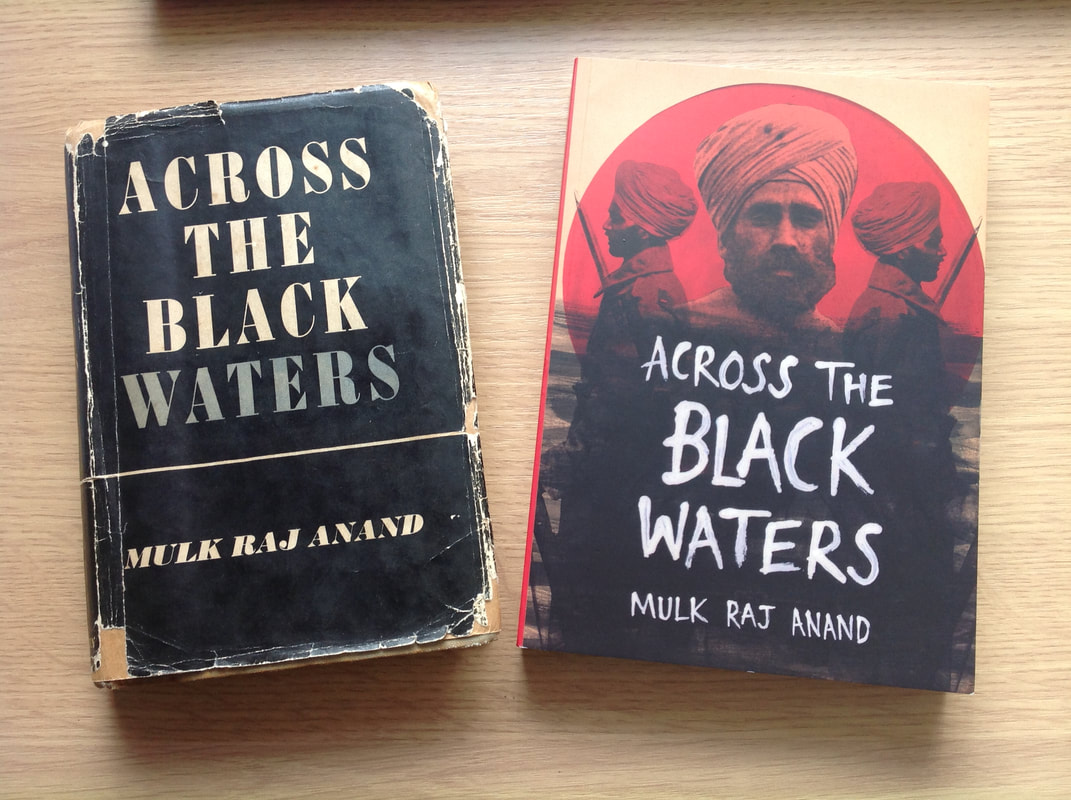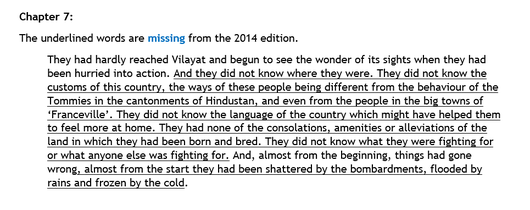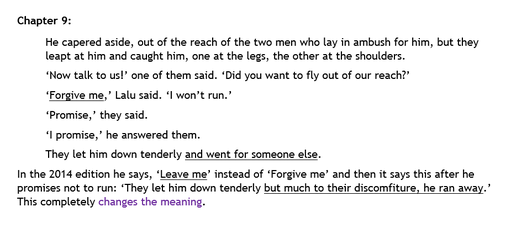|
The 1940 and 2014 editions of Across the Black Waters side by side At the end of April this year, I was thrilled to receive an email from Dominic Rai, presenting me with an opportunity to work on a unique project. My job: to proofread a classic war novel written in the late 1930s and set during World War One. The Project The project, named Salt of the Sarkar, launched in 2014 at the House of Commons with the publication of a new edition of the novel Across the Black Waters by Mulk Raj Anand, which was first published in 1940. Unfortunately, it has since come to light that, over the years and by way of several editions of the book, the text has deviated from the original, quite significantly in some places, with the result that the 2014 edition is not true to Mulk Raj Anand’s 1940 first edition. And so, it has been my absolute privilege as a proofreader to revert the text to the original, proofreading the document used to create the 2014 edition against a rare copy of that first 1940 edition, so that a further new – and this time illustrated – edition can be published, hopefully this autumn if sufficient funds can be raised in time. The Proofread The job turned out not to be as straightforward as it first seemed. The document I was working on was most likely generated by scanning an earlier edition of the book and then using optical character recognition to allow it to be exported to Word. This had created many formatting problems, most of which would not normally be part of a proofreader’s job to fix. These were issues that would usually be dealt with at an earlier stage by an editor (or a proofreader who specialises in checking such documents). Fortunately, I had recently begun a course in editing, so, armed with what I was learning from that, combined with advice from highly experienced editorial colleagues, I was able to correct everything, resulting in a clean and tidy document, which will help when it comes to the next stage of designing the interior of the book ready for printing. There were certain other problems resulting from the conversion that do fall under the usual remit of a proofreader; for example, ‘a dog’s tail’ had been rendered as ‘a clog’s tail’, and several instances of a square bracket – ] – instead of a capital J; both simple fixes. Changes I expected to find, and did find, are those that result from updating styles to reflect modern trends and usage – spelling, hyphenation, capitalisation and italicisation. Such changes are normal and usually acceptable when new editions are published with decades in between. However, I found a great deal more changes than these. More surprising even than the formatting issues, I was not expecting to find so many changes to the narrative. Dominic had alerted me to a couple; for example, on the very first page, ‘the hot, red afternoon’ had at some point in a later edition become ‘the cold afternoon’ and the clause ‘he hated all Sikhs’, also from the first chapter, had been removed. These changes could possibly be explained by someone editing for a new Indian edition, who perhaps didn’t understand the climate in France, and who also wanted to remove anything that could cause offence. But I was astonished when I discovered that whole passages – hugely significant passages – had vanished (see image from chapter 7 for an example of this, with underlined words showing missing text). I cannot fathom why anyone would do such a thing. It is the job of an editor or a proofreader to respect the author’s voice, not to obliterate the very passages that contribute to making the book a great work of literature. Respecting the author’s voice also includes not changing their intended meaning. But I found several instances of this, too. The image from chapter 9 shows an example. Again, I have no idea why anyone would decide to change something in a way that makes the main protagonist act completely out of character. Across the Black Waters and Me
As someone who has studied many European languages, and has seen how languages borrow words or adapt them from other languages, I’ve been fascinated to learn about the contribution Indian words have made to the English language; just a couple of examples are bungalow – the type of house lived in by Europeans in India (Bengal originally, hence the word bungalow), and Blighty – from ‘Vilayat’ which means ‘foreign/European’ but is used in the book to refer to Britain and France as a sort of dream destination. I didn’t study World War One at school – we concentrated on World War Two – so this has been a real eye-opener for me. Of course, I’ve seen TV programmes and films set during World War One, but this is the first novel I’ve read that concentrates on the soldiers’ day-to-day lives, and I feel I now have some insight into what life must have been like, not just for the Indian soldiers, but for all soldiers who witnessed the horrors of trench warfare. They weren’t always in the trenches, though. One of my great-grandfathers sent postcards home from France during the First World War and I’ve often wondered how that was possible, but now I know. This book is not only for war buffs; it is accessible to all readers and everyone can take something away from it. As well as feeling honoured to be chosen to take part in a project of such historical significance, I was drawn to the job on a personal level because of my family connection, not just to World War One, but to India: my grandfather was there during World War Two. Therefore, proofreading Across the Black Waters has been an honour, a huge learning opportunity for me, and a matter of personal significance. As far as I know, not many proofreaders have the chance to work on something like this, and so I consider myself extremely fortunate to have done it at all, and particularly at such a relatively early stage in my proofreading career – I had just completed my first year in business when Dominic contacted me. Hopes for the Book I have had lengthy conversations with Dominic about the book and about the project as a whole. I am in awe of his commitment, for his involvement goes way back to twenty years ago, when he obtained the permission and blessing of Mulk Raj Anand himself to put on a stage production of Across the Black Waters. Mulk was already in his nineties then, and has since passed away. I dearly hope that he would be happy with the book we are aiming to produce now: one that gives the reader the closest possible experience of reading his original version, but with the addition of genuine images of Indian soldiers arriving in France, obtained from the archives of the Daily Mirror, and an introduction written for the 2014 edition by Alastair Niven, who is not only a highly respected figure in the world of literature, and a judge of the Man Booker Prize in 2014, but who was also Mulk’s friend. This blog post was originally published at saltsarkar.com
0 Comments
Your comment will be posted after it is approved.
Leave a Reply. |




